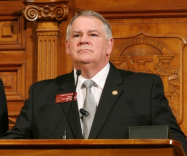
It took some last minute help from Governor Nathan Deal, but House and Senate members have come together on an ethics reform bill.
The measure imposes a $75 cap on lobbyist gifts and all citizens compensated more than $250 to advocate at the Capitol will have to register as lobbyists.
Lawmakers called it historic, but William Perry of the government watchdog group Common Cause Georgia says loopholes remain.
Before voting for it, House Speaker David Ralston acknowledged the bill has some issues.
“Although not perfect this measure does for the first time put some limitations on spending by registered lobbyists on public officials.”
According to Perry, one of the most glaring loopholes is that once a year lobbyists can spend unlimited amounts on food and drink on legislative committees and local delegations.
“In a lot of cases around the state a local delegation is only two people so as long you invite two people you can spend unlimited wining, dining.”
There’s also still no cap on traveling expenses for lawmakers and their guests when the trip is for “educational” purposes. However, the bill now limits travel to inside the U.S. – a detail that brings to mind Speaker Ralston's $17,000 lobbyist-funded trip to Europe in 2010.
In addition, lobbyists can still spend as much as they want on lawmakers – they just have to do it in installments of up to $75.
Perry says despite the loopholes, the bill improves the status quo. More important, he says there's been a culture shift at the Capitol.
“We got a little change to the law but we didn’t get the big step that we want. But we changed behavior so we at least take a step in the right direction. It has become frowned upon to accept lobbyist gifts.”
To help enforce that new culture, the bill reinstates rulemaking authority to the state ethics commission. Lawmakers stripped the agency of that power in 2009. The commission will now be able to pass regulations related to lobbyist spending and campaign finance as it sees fit.


9(MDAxODM0MDY4MDEyMTY4NDA3MzI3YjkzMw004))






